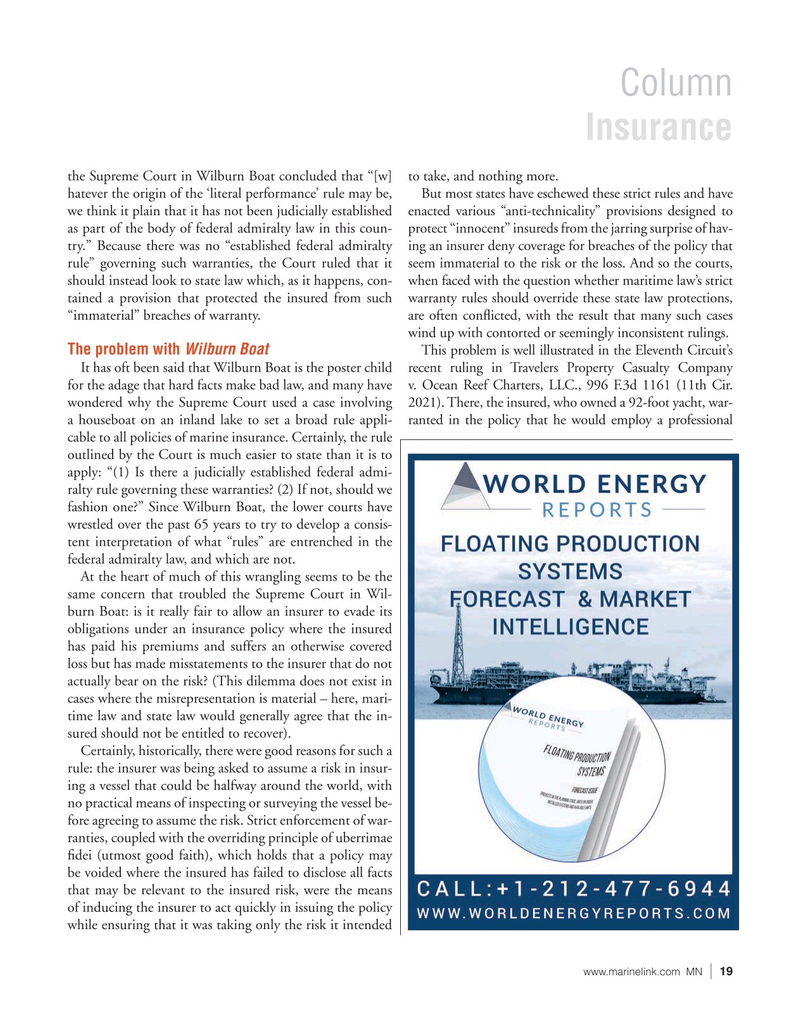
Page 19: of Marine News Magazine (April 2022)
Offshore Energy
Read this page in Pdf, Flash or Html5 edition of April 2022 Marine News Magazine
Column
Insurance the Supreme Court in Wilburn Boat concluded that “[w] to take, and nothing more.
hatever the origin of the ‘literal performance’ rule may be, But most states have eschewed these strict rules and have we think it plain that it has not been judicially established enacted various “anti-technicality” provisions designed to as part of the body of federal admiralty law in this coun- protect “innocent” insureds from the jarring surprise of hav- try.” Because there was no “established federal admiralty ing an insurer deny coverage for breaches of the policy that rule” governing such warranties, the Court ruled that it seem immaterial to the risk or the loss. And so the courts, should instead look to state law which, as it happens, con- when faced with the question whether maritime law’s strict tained a provision that protected the insured from such warranty rules should override these state law protections, “immaterial” breaches of warranty. are often con? icted, with the result that many such cases wind up with contorted or seemingly inconsistent rulings.
The problem with Wilburn Boat
This problem is well illustrated in the Eleventh Circuit’s
It has oft been said that Wilburn Boat is the poster child recent ruling in Travelers Property Casualty Company for the adage that hard facts make bad law, and many have v. Ocean Reef Charters, LLC., 996 F.3d 1161 (11th Cir. wondered why the Supreme Court used a case involving 2021). There, the insured, who owned a 92-foot yacht, war- a houseboat on an inland lake to set a broad rule appli- ranted in the policy that he would employ a professional cable to all policies of marine insurance. Certainly, the rule outlined by the Court is much easier to state than it is to apply: “(1) Is there a judicially established federal admi- ralty rule governing these warranties? (2) If not, should we fashion one?” Since Wilburn Boat, the lower courts have wrestled over the past 65 years to try to develop a consis- tent interpretation of what “rules” are entrenched in the federal admiralty law, and which are not.
At the heart of much of this wrangling seems to be the same concern that troubled the Supreme Court in Wil- burn Boat: is it really fair to allow an insurer to evade its obligations under an insurance policy where the insured has paid his premiums and suffers an otherwise covered loss but has made misstatements to the insurer that do not actually bear on the risk? (This dilemma does not exist in cases where the misrepresentation is material – here, mari- time law and state law would generally agree that the in- sured should not be entitled to recover).
Certainly, historically, there were good reasons for such a rule: the insurer was being asked to assume a risk in insur- ing a vessel that could be halfway around the world, with no practical means of inspecting or surveying the vessel be- fore agreeing to assume the risk. Strict enforcement of war- ranties, coupled with the overriding principle of uberrimae ? dei (utmost good faith), which holds that a policy may be voided where the insured has failed to disclose all facts that may be relevant to the insured risk, were the means of inducing the insurer to act quickly in issuing the policy while ensuring that it was taking only the risk it intended www.marinelink.com MN 19|

 18
18

 20
20
